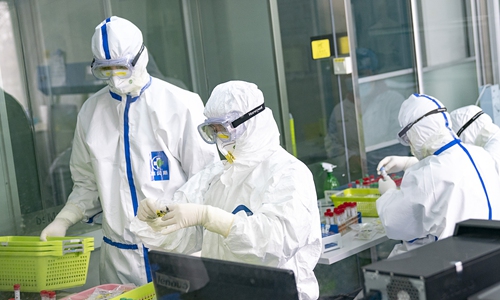HOME >> CHINA
More data needed to prove COVID-19 harms male gonads
Source:Globaltimes.cn Published: 2020/3/27 2:14:40

Staff members work in a laboratory in Wuhan, central China's Hubei Province, Feb. 13, 2020. (Xinhua/Xiong Qi)
A preliminary study by a Wuhan medical team found the first clinical evidence the novel coronavirus (COVID-19) infection could harm male gonad functions by significantly increasing sex hormones.
However, the research team said the study is still ongoing, and more research data would be needed before a definitive conclusion could be reached.
The research team, led by Zhang Ming, with the Reproductive Medicine Center at the South Central Hospital of Wuhan University compared the sex-related hormones of 81 reproductive-aged men with COVID-19 with 100 age-matched healthy men, and found the serum luteinizing hormone (LH), a sex-related hormone, was higher among those infected with the disease.
The ratio of testosterone to LH and the ratio of follicle-stimulating hormone to LH had dramatically decreased in males with COVID-19, which indicated the virus attacked male gonadal function, according to a reprint report published on MedRxiv which has not been certified by peer review.
The study provided the first clinical evidence of the impact COVID-19 had on male sex hormones and gonadal function.
The South Central Hospital of Wuhan University said Thursday that further research and data are needed to support their findings, reported The Beijing News.
Prior to the team's finding, a separate team with the Tongji Medical College in Wuhan suggested that men infected with the coronavirus who want to have children or maintain a healthy sex life should have their semen and hormone levels tested as their study found out that COVID-19 could cause testicular damage and male infertility.
In late February, two researchers at the National Institutes of Health (NIH) also pointed out that novel coronavirus mainly targets spermatogonial and mesenchymal in the testes, reported The Paper on Thursday.
The finding calls for further attention to the gonadal function evaluation among COVID-19 male patients, particularly those at a reproductive age.
It is still unclear whether the affected gonadal function will be restored when the patients recover.
Posted in: SOCIETY